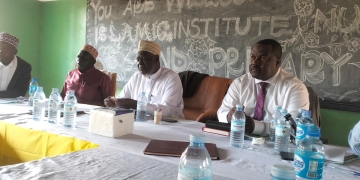
KAMPALA – The global food system is the intricate network that encompasses food production, processing, distribution, and consumption. Climate change, with its rising temperatures, erratic rainfall patterns, and increased frequency of extreme weather events, poses a monumental threat to this system. In developing nations like Uganda, where agriculture forms the backbone of the economy and food security, the effects are particularly pronounced. This article examines how climate change impacts the global food system, with a focus on Uganda’s experiences, and discusses the associated challenges and potential mitigation strategies.
Climate change disrupts the delicate balance of conditions required for optimal crop growth. Rising temperatures and shifting rainfall patterns can shorten growing seasons and reduce crop yields. Globally, staple crops such as wheat, maize, and rice are facing production declines due to heat stress and water shortages.
In Uganda, agriculture contributes approximately 24% to the GDP and employs over 70% of the population. Crops such as coffee, bananas, and maize are critical to both livelihoods and national exports. However, Uganda’s Ministry of Agriculture reports that maize yields have declined in recent years due to prolonged droughts in regions like Karamoja and Buganda. Coffee, a key export, is also under threat, with the Arabica variety particularly sensitive to temperature changes.
Rising temperatures and reduced water availability have a direct impact on livestock health and productivity. Heat stress affects feed quality and reduces milk and meat production. Globally, livestock production losses due to heat stress are estimated to be in the billions annually.
For Uganda, fisheries play a crucial role in food security and income. Lake Victoria, the world’s second-largest freshwater lake, supports the livelihoods of millions. However, warming waters have disrupted fish breeding cycles and reduced fish stocks. The Nile perch population, a cornerstone of Uganda’s fishing industry, is declining due to oxygen depletion caused by rising temperatures.
Climate change-induced disasters disrupt transportation networks, markets, and supply chains, hampering food distribution. Globally, floods and storms destroy infrastructure, making it difficult for farmers to access markets and for consumers to access food.
In Uganda, rural farmers already face challenges due to poor road networks and limited storage facilities. Heavy rains and floods, such as those experienced in the Mt. Elgon region, exacerbate these issues, leaving communities cut off from essential food supplies. The costs of transporting food rise during such events, further limiting affordability for the poor.
Climate change not only affects the quantity of food produced but also its quality. Rising temperatures and extreme weather events increase the prevalence of pests and diseases that affect crops and livestock. Moreover, higher carbon dioxide concentrations are linked to reductions in the nutritional quality of crops, particularly in protein, zinc, and iron.
Uganda has witnessed an increase in fall armyworm infestations, particularly in maize crops, which has led to significant economic losses. Similarly, banana bacterial wilt has been exacerbated by warmer temperatures, affecting the country’s staple food supply. These trends pose serious implications for nutrition, particularly for vulnerable populations dependent on these staples.
Smallholder farmers, who form the backbone of agriculture in many developing nations, are among the most vulnerable to climate change. In Uganda, over 80% of farmers are smallholders. They often lack access to irrigation, modern farming technologies, and financial resources, making them particularly susceptible to climate variability.
During prolonged droughts, many Ugandan farmers resort to selling livestock or abandoning their farms altogether. With limited access to credit or insurance, their ability to recover from such shocks is constrained. This cycle of vulnerability perpetuates food insecurity and poverty.
Uganda offers examples of how traditional and agroecological practices can enhance resilience. Intercropping, agroforestry, and the use of drought-resistant seed varieties have helped some farmers mitigate the impacts of climate change. However, these practices require greater support in terms of research, funding, and dissemination.
Uganda has made progress in developing early warning systems for droughts and floods, particularly through meteorological services. However, coverage remains limited, and many rural communities are still unaware of impending climate events. Expanding these systems globally can significantly reduce the impacts of climate-induced shocks on food production and distribution.
Community-based initiatives, such as collective irrigation schemes and shared storage facilities, have shown promise in improving food security. Uganda’s experience highlights the need for inclusive approaches that involve local communities in planning and implementation.
The lessons from Uganda resonate with broader global trends. Climate change is exacerbating food insecurity in vulnerable regions while also presenting challenges for wealthier nations. Droughts in California, one of the world’s major agricultural hubs, and floods in Europe are stark reminders of the interconnectedness of the global food system.
Uganda’s challenges underscore the urgency of international cooperation. Developed nations, which contribute disproportionately to greenhouse gas emissions, must take greater responsibility by supporting adaptation measures in developing countries. This includes funding for climate-smart agriculture, capacity-building, and technology transfer.
Climate-smart agriculture (CSA) focuses on increasing productivity, enhancing resilience, and reducing emissions. In Uganda, CSA practices such as conservation agriculture and the use of solar-powered irrigation systems are gaining traction. Scaling these practices globally can significantly reduce the vulnerability of the food system.
Effective policies that integrate climate change considerations into agricultural planning are essential. Uganda’s National Climate Change Policy provides a framework for addressing climate-related risks. However, stronger enforcement and resource allocation are needed. Globally, such frameworks must prioritize smallholder farmers and food system resilience.
Innovations in crop genetics, pest management, and water-use efficiency are crucial for adapting to climate change. Uganda’s National Agricultural Research Organization (NARO) has developed drought-resistant crop varieties, but greater investment is needed to scale these solutions.
Globally, approximately one-third of all food produced is wasted, contributing to greenhouse gas emissions and exacerbating food insecurity. Investing in better storage, transportation, and processing infrastructure can reduce waste and enhance food availability. In Uganda, improving post-harvest storage systems can significantly reduce losses, particularly for perishable crops like bananas and maize.
The impact of climate change on the global food system is multifaceted, affecting production, distribution, and accessibility. Uganda’s experiences highlight the vulnerabilities of smallholder farmers and the critical need for adaptation and mitigation strategies. While the challenges are immense, they also present opportunities for innovation, collaboration, and resilience-building.
The global food system must be reimagined to prioritize sustainability and equity. By learning from countries like Uganda and investing in climate-smart solutions, the world can work toward a more resilient future where food security is safeguarded for all.
The writer, Hellen Masika, is a Community Mobilizer at Centre for Citizens Conserving Environment & Management (CECIC).










